Related Research Articles

Bankim Chandra Chattopadhyay was an Indian novelist, poet, essayist and journalist. He was the author of the 1882 Bengali language novel Anandamath, which is one of the landmarks of modern Bengali and Indian literature. He was the composer of Vande Mataram, written in highly Sanskritised Bengali, personifying India as a mother goddess and inspiring activists during the Indian Independence Movement. Chattopadhayay wrote fourteen novels and many serious, serio-comic, satirical, scientific and critical treatises in Bengali. He is known as Sahitya Samrat in Bengali.

Sunil Gangopadhyay or Sunil Ganguly was an Indian poet, novelist, short story writer, and critic in the Bengali language. He was one of the foremost poets experimenting with new forms, themes, rhythms, and words in Bengali poetry in the 1950s and 1960s. In 1953, along with Deepak Majumder and Ananda Bagchi, he founded the Bengali poetry magazine, Krittibas. He is regarded as one of the most prolific and popular writers in Bengali since Rabindranath Tagore.
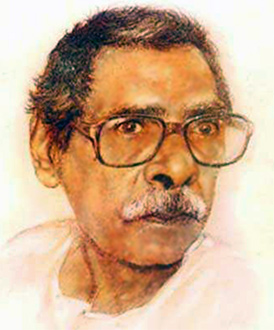
Binoy Majumdar was a Bengali poet who received the Sahitya Akademi Award in 2005.

Mani Sankar Mukherjee is an Indian writer in the Bengali language, who also served as the Sheriff of Kolkata. He grew up in Howrah of West Bengal.

Tarasankar Bandyopadhyay was an Indian novelist who wrote in the Bengali language. He wrote 65 novels, 53-story-books, 12 plays, 4 essay-books, 4 autobiographies, 2 travel stories and composed several songs. He was awarded Rabindra Puraskar, Sahitya Akademi Award, Jnanpith Award, Padma Shri and Padma Bhushan. He was nominated for Nobel Prize in Literature in 1971 and posthumously nominated in 1972.
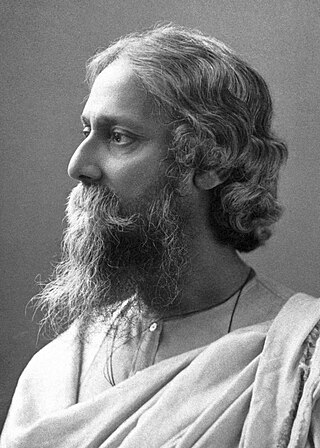
Bengali literature denotes the body of writings in the Bengali language and which covers Old Bengali, Middle Bengali and Modern Bengali with the changes through the passage of time and dynastic patronization or non-patronization. Bengali has developed over the course of roughly 1,400 years. If the emergence of the Bengali literature supposes to date back to roughly 650 AD, the development of Bengali literature claims to be 1600 years old. The earliest extant work in Bengali literature is the Charyapada, a collection of Buddhist mystic songs in Old Bengali dating back to the 10th and 11th centuries. The timeline of Bengali literature is divided into three periods: ancient (650–1200), medieval (1200–1800) and modern. Medieval Bengali literature consists of various poetic genres, including Hindu religious scriptures, Islamic epics, Vaishnava texts, translations of Arabic, Persian and Sanskrit texts, and secular texts by Muslim poets. Novels were introduced in the mid-19th century. Nobel laureate Rabindranath Tagore is the best known figure of Bengali literature to the world. Kazi Nazrul Islam, notable for his activism and anti-British literature, was described as the Rebel Poet and is now recognised as the National poet of Bangladesh.

Annada Shankar Ray was an Indian poet and essayist in Bengali. He also wrote some Odia poetry.
The Rabindra Puraskar is the highest honorary literary award given in the Indian state of West Bengal. This award is named after the famous Indian poet Rabindranath Tagore and is administered by the Government of West Bengal under the aegis of the Paschimbanga Bangla Academy, Kolkata.The award is given for creative literature, non-fiction and books about Bengal in Bengali as well as other languages.

Narayan Debnath was an Indian comics artist, writer and illustrator. He created the Bengali comic strips Handa Bhonda (1962), Bantul the Great (1965) and Nonte Phonte (1969). He holds the record of longest running comics by an individual artiste for Handa Bhonda comics series which completed its continuous 53 years of running. He was the first and only comics artist in India who has received a D. Litt. degree. Debnath was awarded Padma Shri, the fourth highest civilian award in India, in the year 2021.
The Ananda Puraskar is an award for Bengali literature awarded annually by the ABP Group to writers using Bengali, usually from West Bengal, India.
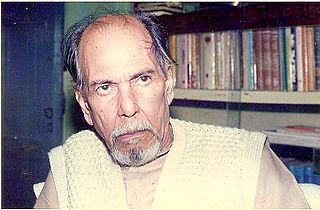
Amiya Bhushan Majumdar was an Indian novelist, short-story writer, essayist and playwright. In a writing career spanning over four decades, Majumdar wrote numerous novels, short stories, plays and essays in Bengali. Known as the ‘Writer’s Writer’, Majumdar is considered one of the most noteworthy authors of modern Bengali prose. His works received significant critical acclaim and recognition – including the Sahitya Academi Award for his novel Rajnagar in 1986
Nabendu Ghosh was an Indian author in Bengali literature, and screenwriter. He has written screenplays of classic Bollywood movies like, Sujata, Bandini, Devdas, Majhli Didi, Abhimaan and Teesri Kasam. He has written stories for movies like Baap Beti, Shatranj, Raja Jani. He has also acted briefly in Do Bigha Zameen, Teesri Kasam and Lukochuri. Later in his career, he directed four movies as well.
Bankim Puraskar is the highest award given by the Government of West Bengal for contribution to Bengali fiction. The award was instituted in 1975 in memory of Bankim Chandra Chattopadhyay, a famous Bengali novelist of the 19th century. It has been brought under the aegis of Paschimbanga Bangla Akademi, functioning under the Department of Information & Cultural Affairs, in 2003. The award is handed over by the Chief Minister of West Bengal.
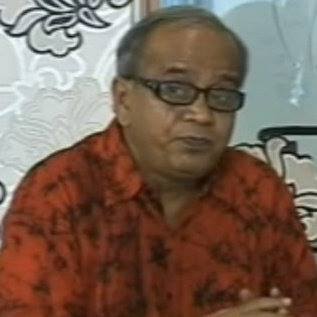
Amar Mitra is an eminent writer in Bengali living in Kolkata, West Bengal. His elder brother is notable actor Manoj Mitra.
Sankari Prasad Basu was an Indian scholar, writer and critic who writes mainly in the Bengali language. He is a researcher on Swami Vivekananda and his books on the subject include Sahashya Vivekananda and Bandhu Vivekananda. One of his notable publications is his seven-volume research work Vivekananda o Samakalin Bharatbarsha, for which he won the prestigious Sahitya Akademi Award in 1978.
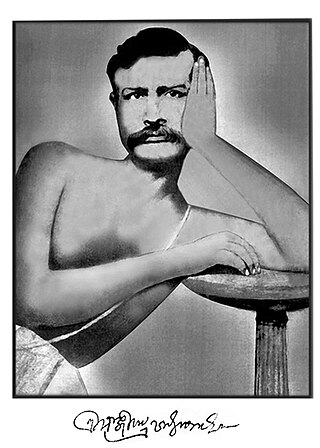
Sanjib Chandra Chattopadhyay was a Bengali writer, poet and journalist. He was the elder brother of Bankim Chandra Chattopadhyay.
Afsar Amed was an Indian Bengali writer. He wrote 27 novels and 24 other books.

Swapnamoy Chakraborty is a Bengali novelist and essayist.
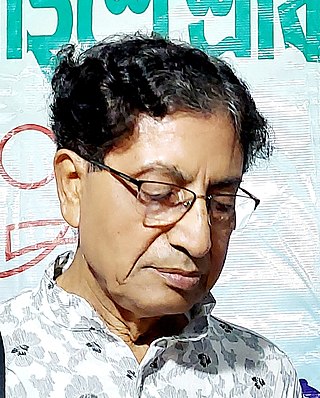
Tapan Bandopadhyay is an eminent Bengali novelist. He won the Sahitya Akademi Award in 2022 for his novel Birbal.
References
- 1 2 "..:: SAHITYA : Akademi Awards ::." sahitya-akademi.gov.in. Retrieved 31 August 2021.
- 1 2 "Prafulla Roy". Beebooks. Retrieved 26 December 2021.
- 1 2 3 4 "Prafulla Roy". Beebooks. Retrieved 31 August 2021.
- 1 2 প্রফুল্ল রায় ও কেয়াপাতার নৌকো. Bangladesh Pratidin (in Bengali). 26 April 2019. Retrieved 26 December 2021.
- 1 2 3 4 "Prafulla Roy". www.goodreads.com. Retrieved 21 September 2021.